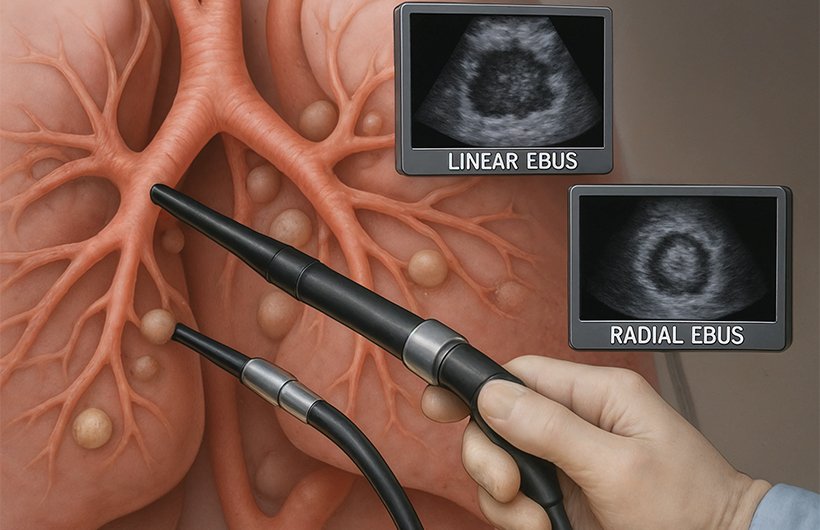EBUS (Linear & Radial) for Lung Cancer & Infections

Lungs Specialist in Hyderabad
If you’re seeking advanced, minimally invasive approaches to diagnose and treat lung diseases, Dr. Kunal Waghray, a leading Interventional Pulmonologist in Hyderabad, provides advanced Endobronchial Ultrasound (EBUS) procedures, including both linear and radial techniques. Whether you’re facing a concern like lung cancer, unexplained infections, or lymph node enlargement, EBUS provides accurate, safe, and efficient solutions.
What is EBUS?
Endobronchial Ultrasound (EBUS) is an advanced bronchoscopy technique that combines ultrasound and fiber-optic imaging to visualize the airways and nearby structures in real time. EBUS has revolutionized lung diagnostics by enabling minimally invasive biopsies of lymph nodes and lung tumors, drastically reducing the need for more invasive procedures.
There are two main types of EBUS:
- Linear EBUS
- Radial EBUS
Each serves a unique purpose and offers tailored benefits based on the patient’s condition.
1. Linear EBUS
- Diagnosing lung cancer
- Performing accurate cancer staging
- Sampling enlarged mediastinal or hilar lymph nodes
- Evaluating suspected infections like tuberculosis or sarcoidosis
- Precise needle placement with real-time feedback
- Excellent safety profile with minimal bleeding risk
- Outpatient procedure patients can often return home the same day
2. Radial EBUS
Radial EBUS involves inserting a 360-degree rotating ultrasound probe through the bronchoscope’s working channel to visualize lung structures. It provides a radial (360°) ultrasound image of the airway’s surrounding tissues. After identifying the lesion using ultrasound, biopsy tools such as brushes, forceps, or mini-biopsy needles can be deployed through the bronchoscope.
Ideal for:
- Investigating small peripheral lung nodules or lesions
- Guiding transbronchial biopsies
- Mapping airways to obtain diagnostic tissue samples
Advantages:
- Effective for small or peripheral lung lesions (<2 cm)
- Versatile sampling methods (brush, forceps, or biopsy)
- These procedures are minimally invasive and typically carried out in outpatient settings.
In situations where a CT scan reveals a small, hard-to-reach lung lesion, radial EBUS helps Dr. Kunal Waghray guide instruments accurately to the target, significantly enhancing the chance of a definitive diagnosis.
Who Should Consider EBUS?
- Patients with unexplained lymph node enlargement in the chest
- Individuals with suspicious lung nodules on CT scans
- Those needing lung cancer staging or restaging after treatment
- Patients with possible lung infections or granulomatous diseases (e.g., tuberculosis or sarcoidosis)
EBUS: A Smart Diagnostic Revolution
Here’s why EBUS stands out:
- Minimally Invasive: Avoids surgical cuts and lengthy hospital stays
- Safe: Low risk of complications like bleeding or infection
- Efficient: Accurate sampling of even small or hidden lesions
- Quick Recovery: Most patients are home in under 24 hours
By blending linear EBUS’s strength in sampling central lymph nodes with radial EBUS’s finesse in addressing peripheral nodules, Dr. Kunal Waghray offers a comprehensive diagnostic toolkit unmatched in Hyderabad.


